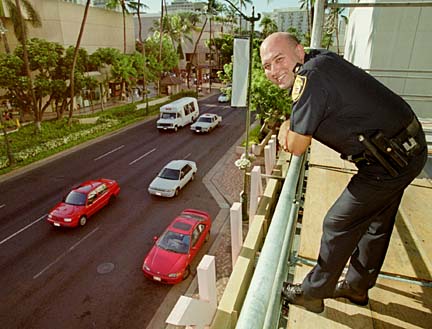Advertisement - Click to support our sponsors.


Cop nesting At 6 a.m. today, Kurt Kendro became the "cop on top."
atop theater for
Special Olympics
The 'cop on top' will stay at his
Waikiki post until he can raise
$10,000 for the groupBy Rod Ohira
Star-BulletinThe Honolulu police lieutenant, an active participant in Hawaii Special Olympics fund-raisers, will sit atop Consolidated's Waikiki 3 Theatre on Kalakaua Avenue until $10,000 is donated to the organization.
"It was successful in Nebraska and Arizona," Kendro said. "A friend of mine, Det. Skip Woodward of the Tucson Police Department, made $10,000 in 17 hours by sitting on a highway billboard."
Kendro will be seated about 25 to 30 feet above street level on rooftop scaffolding set up by Atlas Sales.
Donations can be made from a drive-through lane near the site or by calling Hawaii Special Olympics at 531-1888, extension 0.
"We're doing it to raise funds and community awareness about Special Olympics," Kendro said. "I'd do anything for the Special Olympic athlete, even if it means crawling down Kalakaua Avenue."
The Law Enforcement Torch Run group, which has about 3,000 members from military, federal, state and county agencies, as well as private security, is involved in several Special Olympics fund-raisers.
The annual Troy Barboza Torch Run, named after the late Honolulu police officer who was gunned down in October 1987, is a major event.
There are also the 12-year-old "Tip a Cop" and 2-year-old "Cops and Lobsters" waiter programs at Ward Centre and Red Lobster Restaurant; the "Plane Pull," in which teams compete to pull a Hawaiian Airlines DC-9 plane 12 feet and a pistol tournament.
Kendro, 36, an HPD field-training supervisor, was the department's Officer of the Year in 1992. His relationship with Barboza is a major reason he's involved with Special Olympics.
"I want to keep Troy's spirit alive and remember a good friend," said Kendro, who graduated with Barboza in HPD's 92nd Recruit Class.
During field training in Waikiki, the two officers were encouraged by their then-sergeant, Paul Epstein, to get involved with Special Olympics.
They started by coaching soccer and basketball, Kendro said.
"Athletics was so important in our lives that it's hard to imagine what it would have been like without it," Kendro said. "We just wanted to give people the same joy we had. When you see them smiling, it's just so special."
Noreen Conlin, director of public relations and development for Hawaii Special Olympics, said the local program provides competition in 10 sports for 1,600 athletes with mental retardation.
"Friendships are the most important thing for our special athletes," Conlin said, "because when they're competing, they're in a world where everybody is equal."